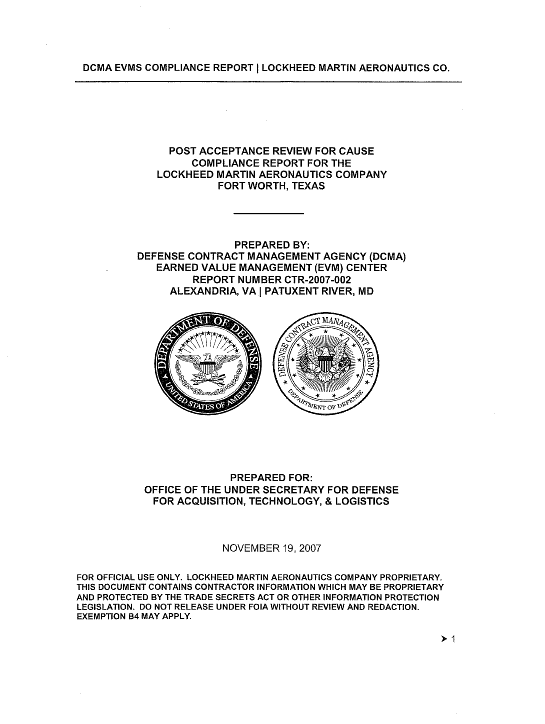 REPORT NUMBER CTR-2007-002
REPORT NUMBER CTR-2007-002
- 6 pages
- For Official Use Only
- November 19, 2007
PREFACE
Earned Value Management (EVM) plays an increasingly important role for successfully delivering acquisition programs at the desired cost, schedule, and technical performance levels. Since 1996, when the Defense Contract Management Agency (DCMA) was appointed DoD Executive Agent for Earned Value Management Systems (EVMS), the responsibility to oversee the Department’s primary program management process has never been more vital than it is today. In its simplest form, EVM is the discipline of managing programs successfully by planning and controlling authorized work to achieve cost, schedule, and performance objectives. EVM places special emphasis on efficiently and effectively executing work through the development and operation of management control system that includes people, systematic processes, and innovative tools and techniques. The intent of EVM is to help program managers, and the teams who support them, be successful by allowing them to operate productively in the high-risk environments surrounding them.
EXECUTIVE SUMMARY
The DCMA EVMS compliance review, conducted 20-31 August 2007, found that
Lockheed Martin Aeronautics Company (LM-Aero), Fort Worth, Texas, is not following,
nor consistently applying, the American National Standard Electronic Industries Alliance
Earned Value Management Systems (ANSI/EIA-748-A) guidelines during the execution
of Department Programs. The findings of the review indicate that, under LM-Aero
stewardship, the utility of the EVMS has declined to a level where it does not serve its
intended purpose and the government is not obtaining useful program performance data
to anticipate and mitigate program risks.Key LM-Aero EVMS processes and procedures are below standard and do not
provide the requisite definition and discipline to properly plan and control complex,
multibillion dollar weapon systems acquisition programs. Documented findings indicate
that a large percentage of LM-Aero Control Account Managers (CAM) are disconnected
from basic LM-Aero EVMS functions and ran not satisf actorily demonstrate that they
understand and use documented EVM processes, procedures and tools to manage their
work. These weaknesses adversely impact the validity of the data used in internal and
external decision-making processes and are fully discussed in this report.
Specifically, LM-Aero was found to be non-compliant in 19 of 32 industry
guidelines. Significant findings, resulting in lack of planning and control disciplines
include:Using vague and confusing EVMS documentation;
Lack of clearly delineated roles and responsibilities;
Using management reserve to alter internal and subcontract performance levels and overruns;
Work authorization and change control processes that do not extend to appropriate levels;
Cost and schedule integration problems that undermine the validity of data;
Inappropriate earned value techniques used for the assessment of material, subcontracts, and rework; and
The inability of LM-Aero CAMs to demonstrate a working level
understanding of key EVMS processes including the definition and use of a program critical path, situational awareness of cost and schedule variances
for course correction, and the substantiation of completion cost estimates.
These and the other identified deficiencies raise significant concerns regarding
LM-Aero management processes and practices and the Company’s ability to mitigate
emerging cost and schedule issues in a timely manner. Because the accuracy and
validity of LM-Aero performance measurement data is suspect, the Department’s ability
to use EVM data to determine product delivery dates and to develop timely and accurate
estimates of program completion costs is adversely impacted.It was apparent during discussions with LM-Aero CAMs that their involvement in
performing their EVM responsibilities was superficial at best. Most CAM functions are
being performed, with little management control, by the business operations personnel
assigned to Integrated Product Teams (IPT). The result is a serious deterioration of
system discipline.This undisciplined approach to program management and towards the
maintenance of the EVMS, will ultimately jeopardize the long-term stability of LM-Aero
programs at Fort Worth, Texas facilities and diminishes the purchasing power of the
Department.Given the nature of the risks involved in the achievement of programmatic
objectives, the LM-Aero management systems and processes reviewed did not provide
reasonable assurance that established Department objectives for supplier EVMS would
be achieved. Therefore, we believe significant corrective actions are needed immediately
to help ensure compliance with applicable regulations, policies and procedures, and
good business practices.RECOMMENDATIONS
We recommend that:
1. Under Secretary of Defense for Acquisition, Technology, and Logistics
should establish incentives for implementing and maintaining EVM Systems.
For all new contracts include a contract clause for withholding up to 5-10
percent from supplier payments for failure to adequately implement and
maintain a validated EVM System. For existing contracts, add a provision
within the program award fee plan to establish similar incentives;2. Lockheed Martin should review each LM-Aero location to ensure that the
LM-Aero EVMS is properly implemented and that LM-Aero Fort Worth, TX
findings are not systemic throughout the LM-Aero division;3. LM-Aero and the Program Management Office should jointly develop and
provide to the DCMA, no later than February 8, 2008, a plan of corrective
action plan and milestones to address all compliance and program
application issues in order to retain EVMS certification. The corrective
action plan should contain a root cause analysis of system deficiencies and
include measurable steps to correct them. The action plan should conclude
with a follow-on compliance review in 4Q CY2008;4. DCMA CMO Fort Worth should notify relevant Department stakeholders,
including service SAE and PEO of the results of the compliance review and
next steps; and5. DCMA CMO Fort Worth should develop and adopt a risk based staffing
approach to ensure for the proper levels of oversight needed for supplier
EVMS implementation.
